
French postcard by Massilia. Photo: Studio Intran.

French postcard by Editions et Publications Cinematographiques (EPC), no. 12. Photo: Limot / Paris Film Production.

French postcard by Editions P.I., Paris, no. 33. Photo: Star.
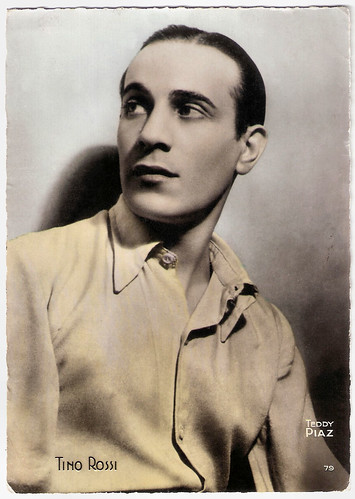
French postcard by O.P., Paris, no. 79. Photo: Teddy Piaz.
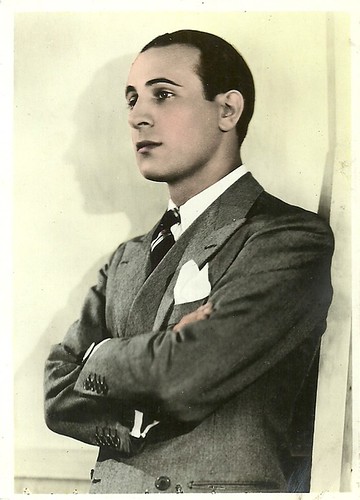
French postcard. The edges have been cut off but it looks like a Viny card. Written on the back: "1939 Avril" [April 1939].
Operatic Voice
Constantino Rossi was born as the third of eight children in a Corsican family in Ajaccio, France, in 1907.
He was gifted with an operatic voice. As a teenager, he played guitar and sang at a variety of small venues in his hometown before going on to perform in Marseilles and at resort clubs along the French Riviera.
He competed in amateur singing contests while working for a mortgage company to support himself. Though a failed marriage detoured him and his career briefly, eventually, a promoter saw Rossi performing and signed him in 1929 to a short tour circuit.
Although that and the two songs he recorded with Parlophone, 'O Ciuciarella' and 'Ninni Nanni', didn't bring him immediate success, in 1933 Columbia offered him the deal he wanted.

French postcard by Editions et Publications Cinématographiques, no. 119. Photo: Arnal / EPC.

French postcard by A.N., Paris, no. 6492. Image: Jacques Weismann, 1936.
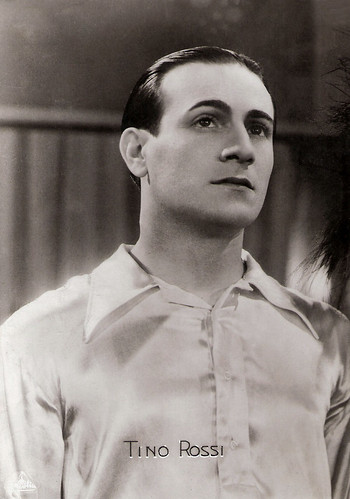
French card by Massilia.

French postcard by Editions O.P., Paris, no. 136. Photo: Star.

French postcard by Erpé, no. 545. Photo: Star.
Major Box Office Attraction
In 1934 Tino Rossi represented Corsica in La Parade de France, where he was met with much acclaim.
His fame truly commenced when he began starring in film musicals like Naples au Baiser de Feu/The Kiss of Fire (Augusto Genina, 1937) with Michel Simon and Mireille Balin.
His romantic ballads had women swooning and his art songs by Jules Massenet, Reynaldo Hahn, and other composers helped draw massive audiences wherever he performed.
Rossi's success was greatly aided by songwriter Vincent Scotto, who wrote his first hits and collaborated with him for many years.
Prior to World War II, Rossi was a major box office attraction in the French-speaking world but expanded his audience to America with a 1938 visit followed up by wartime tours across the USA and Canada.

French postcard by Viny, no. 35. Photo: Paris Film Production.

French postcard by SERP, Paris, no. 69. Photo: Studio Harcourt.

French postcard by Editions du Globe, Paris, no. 107. Photo: Studio Harcourt.

French postcard by Edition P.I., Paris, no. 4.

Vintage postcard.
Latin Lover
A ‘Latin lover’ persona made Tino Rossi a true film star. He began his film career in Les nuits moscovites/Moscow Nights (Alexis Granowsky, 1934) starring Annabella, but his first real success came with Marinella (Pierre Caron, 1936) with Yvette Lebon.
It was followed by Lumières de Paris/Lights of Paris (Richard Pottier, 1938) with Michèle Alfa, Fiévres/Fever (Jean Delannoy, 1942) opposite Jacqueline Delubac, and Le Soleil a toujours raison/The Sun Has Always a Reason (Pierre Billon, 1943) co-starring Charles Vanel.
All his films were musicals and capitalised on his success as a singer. During the occupation of France by Nazi Germany, Rossi's film career reached its peak, notably with Mon amour est près de toi/My Love Is For You (Richard Pottier, 1943) and L'île d'amour/The Isle of Love (Maurice Cram, 1944) with Josseline Gaël.
After the Liberation, the French authorities reproached him for associating with the French Gestapo, but most importantly for actively supporting collaborationist causes such as the LVF (Légion des Volontaires Français) who sent French volunteers to work in German factories.
He was arrested in October 1944 and spent three weeks in Fresnes prison (near Paris). Following a trial in 1945, his sentence was relatively light unlike that of colleagues as Arletty, Mireille Balin, and Josseline Gaël. Rossi received a retrospective and largely symbolic work suspension.

German postcard by Ross Verlag, no. A 1025/1, 1937-1938. Photo: Intran-Studio, Paris.
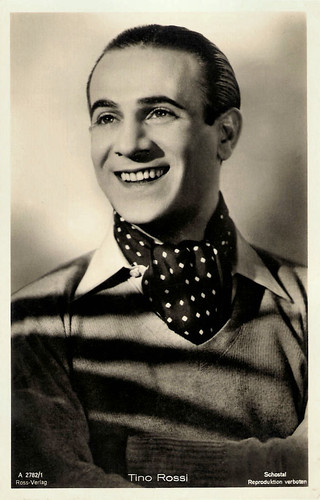
German postcard by Ross Verlag, no. A 2782/1, 1939-1940. Photo: Schostal.
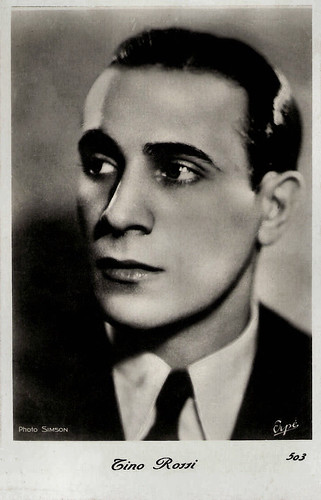
French postcard by Erpé, no. 503. Photo: Simson.

French postcard by A.N., Paris, no. 1036. Photo: Intran Studio, Paris.

French postcard by Editions P.I., no. 107. Photo: Sigma-Cyrnos. Tino Rossi in L'île d'amour/The island of love (Maurice Cam, 1944).
Overwhelming popularity
Tino Rossi's post-war films include Sérénade aux nuages/Song of the Clouds (André Cayatte, 1946), Destins/Destinies (Richard Pottier, 1946) with Mila Parély, Le Gardian/The Guardian (Jean de Marguenat, 1946), and Marlène (Pierre de Hérain, 1949).
Destins/Destinies (1946) contained his most popular song, 'Petit Papa Noël', which sold more than thirty million copies worldwide. In 1947 he married Lilia Vetti, a young dancer and actress he had met while making Le Chant de l'exilé/The Song of the Exile (André Hugon, 1943). They would have a son, Laurent, in a marriage that lasted for a lifetime.
In 1954, he joined the all-star cast of Si Versailles m'était conté/Affairs in Versailles (Sacha Guitry, 1954), the history of the palace of Versailles from its founding to the present. James Travers at Films de France: "Towards the end of his career, writer and film director Sacha Guitry made three major historical films, each of which earned him critical acclaim and each of which has retained enduring popularity. Si Versailles m’était conté is arguably the best of the three, although its sister films Si Paris nous était conté and Napoléon are also highly regarded by many. All three films are lavish, well-scripted episodic historical films, featuring a dizzying cast of France’s best-known actors."
In 1955 Tino Rossi starred in the stage operetta 'Méditerranée', and in the following years, he continued performing around France and the world. His career also evolved into the television era, appearing in a number of popular variety shows. By the 1960s, Rossi largely retired from performing as he passed his 50th birthday and rock-and-roll made his style of music obsolete.
In 1982, President François Mitterrand named Tino Rossi a Commander of the Legion of Honor for his contribution to France and its culture. That same year the 75-year-old singer gave his last public performance at the Casino de Paris, a show that popular demand turned into a three-month stint. Their overwhelming popularity even earned the performer a new recording contract with Pathé Marconi. However, soon after his farewell concerts, Tino Rossi died of pancreatic cancer in his home in Neilly-sur-Seine, one of the Parisian suburbs, in 1983.

French postcard.
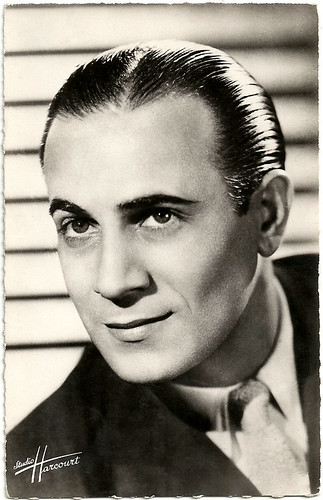
French postcard by Editions du Globe, Paris. Photo: Studio Harcourt.

Dutch postcard by Uitg. Takken, Utrecht, no. AX 333.
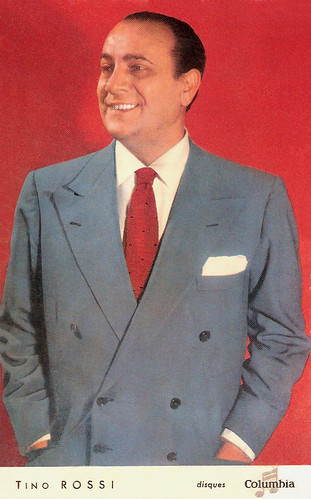
French postcard by JPH. Photo: Disques Columbia.
Sources: James Travers (Films de France), Marisa Brown (AllMusic), Wikipedia, and IMDb.
7 comments:
Petit Papa Noel! That was the first French Christmas Carol I ever earned. What a classic. I'll be watching this clip over and over again. Tino Rossi was such a heartthrob!
I like the tinting on the first card.
It is interesting to note who each generation deems a romantic ideal.
What a wonderful post this has been. Thank you so much--you do put so much work and research into your blog. I thoroughly enjoyed every word.
From America, Happy Thanksgiving and Happy PFF!
You do such a great job of these profiles. I truly appreciate it!
Your cards are amazing and so is the information. The style of the men of those days is quite different from now.
Judy
It was a bit early for Christmas, but there are a lot of Christmas lights in the streets of Amsterdam already. Thank you all for stopping by again and see you next friday, next PFF.
I really like the coloring on the first card. He was quite handsome! Happy PFF!
Post a Comment